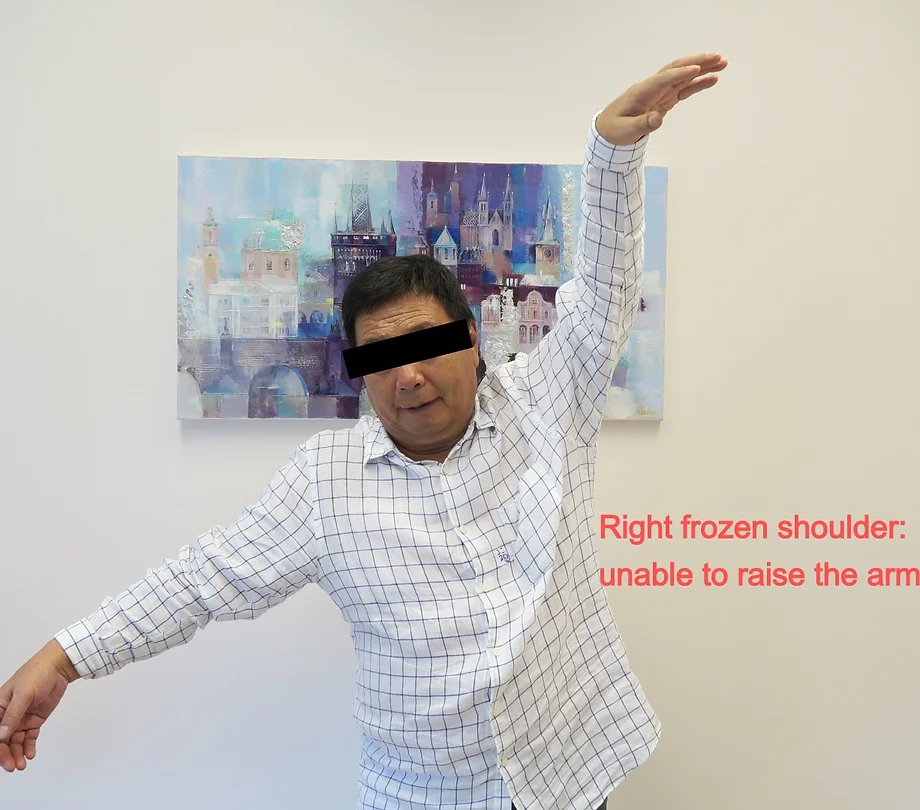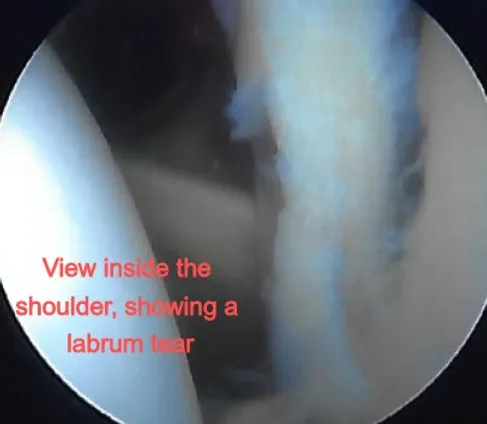Shoulder Specialist Services in Singapore

The shoulder is the most flexible joint in the body with the largest range of movement. Consequently, it is also the most frequently injured or dislocated joint in the body.
Shoulder pain or injury is a common complaint that can significantly impact your daily life, limiting your ability to perform simple tasks and participate in activities you enjoy. If you’re experiencing persistent shoulder pain, it’s crucial to seek expert care from a shoulder specialist in Singapore immediately, for the best treatment outcomes possible.
At Centurion Orthopaedic Centre, our experienced team provides comprehensive diagnosis and shoulder pain treatment for various conditions, helping you regain mobility and alleviate discomfort.
We understand that shoulder pain can stem from various underlying issues, including rotator cuff injuries, frozen shoulder, arthritis, and more. Our shoulder pain specialists are dedicated to providing personalised care, utilising the latest treatment techniques and evidence-based practices to address your specific needs and help you achieve long-term relief.
When to See a Shoulder Pain Specialist
While occasional shoulder pain may resolve on its own, certain symptoms warrant a visit to a shoulder specialist. These include:
- Persistent shoulder pain or stiffness
- Difficulty lifting or rotating your arm
- Pain radiating to the upper arm or neck
- Shoulder instability or dislocations
- Weakness or inability to perform daily activities
If you experience any of these symptoms, consult a shoulder pain specialist as soon as possible.


Common Shoulder Pain Conditions Treated
Our shoulder specialists in Singapore have extensive experience in diagnosing and treating a wide range of shoulder pain conditions, including:
Rotator Cuff Tear
- Causes: Rotator cuff tears may result from acute injuries, such as falls or sports injuries, or from gradual wear and tear over time. Repetitive overhead activities and heavy lifting are common contributing factors.
- Symptoms: Key symptoms include pain (particularly when lifting the arm or lying on the affected side at night), weakness, and a limited range of motion. Some individuals may also experience a clicking or popping sensation in the shoulder.
- Potential Complications: If left untreated, rotator cuff tears can lead to chronic pain, muscle atrophy, and difficulty with daily activities. In severe cases, the condition may progress to rotator cuff arthropathy, a form of arthritis in the shoulder joint caused by untreated tears.
- Treatment: Rotator cuff repair options depend on the severity of the tear and may include physiotherapy, corticosteroid injections, or arthroscopic (keyhole) surgery for repair.
Frozen Shoulder
- Causes: The exact cause of frozen shoulder remains unclear, but it often develops after an injury or surgery that immobilises the shoulder. It is more prevalent in individuals with diabetes or thyroid disorders and can sometimes occur spontaneously in people in their 50s.
- Symptoms: Frozen shoulder is characterised by significant stiffness, pain, and a severely reduced range of motion in the shoulder joint, making daily tasks such as dressing or reaching overhead challenging.
- Progression: The condition typically follows three stages:
- Freezing: Increasing pain and stiffness.
- Frozen: Persistent stiffness with some pain reduction.
- Thawing: Gradual improvement in mobility and reduction in symptoms.
- Potential Complications: While frozen shoulder often resolves on its own (usually within 1-2 years), it may lead to long-term stiffness or pain if not properly managed.
- Treatment: Management focuses on pain relief and restoring mobility through physiotherapy, medications, and occasionally minimally invasive procedures like hydrodilatation or arthroscopic surgery.
Shoulder Impingement
- Causes: Shoulder impingement occurs when the tendons surrounding the shoulder joint (rotator cuff tendons) are compressed by the acromion bone, leading to pain and inflammation. It is common among individuals aged 20–50 and may result from activities like heavy lifting, repetitive overhead movements, or sports.
- Symptoms: Pain is typically worse when lifting the arm overhead or reaching behind the back. Weakness, stiffness, and reduced range of motion are also common.
- Potential Complications: If untreated, shoulder impingement can lead to more severe conditions such as frozen shoulder, rotator cuff tears, or bursitis (inflammation of the bursa).
- Treatment: Initial treatment includes rest, ice application, physiotherapy, medications, and corticosteroid injections. For persistent cases, shoulder arthroscopy may be performed to shave down the acromion bone and decompress the affected tendons.
Shoulder Arthritis
- Causes: Shoulder arthritis is caused by the degeneration of cartilage in the shoulder joint, leading to pain, stiffness, and limited movement. This can be due to wear and tear or inflammatory conditions (e.g. rheumatoid arthritis).
- Symptoms: Pain, stiffness, and a grinding sensation in the shoulder are common symptoms.
- Progression/Development: Arthritis can progress gradually over time, leading to increasing pain and disability. Severe arthritis can significantly limit daily activities and quality of life.
- Treatment: Treatment options include medications, injections, physiotherapy, and in advanced cases, shoulder joint replacement surgery.
Shoulder Dislocation
- Causes: Shoulder dislocations occur when the ball of the upper arm bone pops out of the socket. They are usually caused by a sudden injury, such as a fall or a direct blow to the shoulder.
- Symptoms: A dislocated shoulder will appear visibly deformed, and there will be severe pain, swelling, and inability to move the arm.
- Potential Complications: Recurrent dislocations can lead to instability and damage to the surrounding tissues.
- Treatment: Shoulder dislocation is a very common injury that can be treated with or without surgery. This depends on the patient’s age and activity requirement, and whether the shoulder recurrently dislocates. Shoulder dislocation treatment typically involves putting the bone back into place (reduction), followed by immobilisation and rehabilitation. For more severe first-time dislocations, or recurrent dislocations, surgery may be necessary to stabilise the joint.
Diagnosis of Shoulder Conditions
Accurate diagnosis is essential for effective shoulder pain treatment. Our specialists use a combination of methods to diagnose shoulder conditions including X-rays (to assess bone alignment and identify any fractures); MRI (to evaluate soft tissues surrounding the shoulder); and physical examination (to assess range of motion, identify pain points, and evaluate muscle strength and stability).
Non-Surgical Treatments for Shoulder Pain
In milder cases, shoulder pain can be effectively managed with non-surgical treatments. These include:
- Physiotherapy: A cornerstone of shoulder pain treatment, physiotherapy focuses on strengthening exercises, improving flexibility, and restoring normal movement patterns.
- Injections: Steroid injections can help reduce inflammation and pain, while biological tissue-healing injections can stimulate the body’s natural healing process.
- Ultrasoundtherapy: This non-invasive treatment can be effective for conditions like shoulder impingement or bursitis.
Our shoulder pain specialist can assess your symptoms and recommend suitable non-surgical treatments.
Surgical Solutions for Shoulder Pain
While non-surgical options are often the first line of treatment, surgery may be necessary in certain cases, such as:
- Severe rotator cuff tears
- Frozen shoulder that doesn’t respond to conservative treatment
- Advanced shoulder arthritis
- Severe or recurrent dislocations
- Persistent impingement
- Biceps issues with pain
Common surgical treatment procedures for shoulder pain include:
- Arthroscopic (Keyhole) Surgery: This minimally invasive technique is used for rotator cuff repairs, impingement syndrome, frozen shoulder, dislocation treatment, and other shoulder conditions.
- Joint Replacement Surgery: For end-stage shoulder arthritis or severe joint degeneration, shoulder joint replacement surgery can help relieve pain and restore function.
Recovery and Rehabilitation for Shoulder Pain
Recovery after shoulder pain treatment varies depending on the specific condition and treatment approach. Generally, keyhole procedures that do not involve tissue repair (e.g., frozen shoulder release or impingement surgery) may take 4–6 weeks to regain a good range of motion. However, procedures requiring tissue repair (e.g., rotator cuff or labrum repair) may require up to 3 months to achieve similar progress. For conditions managed conservatively, recovery periods can vary widely—for instance, from 3 months for impingement to as long as 2 years for frozen shoulder.
Following surgical procedures, physiotherapy and post-treatment care are crucial for restoring mobility, strength, and function. Our joint pain specialists will guide you in managing pain, preventing recurrence, and gradually returning to normal activities.
If you are experiencing recurrent shoulder pain or suspect a shoulder injury, schedule an appointment with Centurion Orthopaedic Centre’s experienced shoulder pain specialists for personalised care and effective treatment.
Frequently Asked Questions About Shoulder Pain Treatment
What are the most common causes of shoulder pain?
Shoulder pain can arise from various factors, with the most common being rotator cuff injuries, frozen shoulder, shoulder impingement, and shoulder arthritis. Other causes include tendonitis, bursitis, dislocations, and fractures. Overuse, repetitive motions, poor posture, and sudden injuries can also contribute to shoulder pain.
Can frozen shoulder resolve without surgery?
Yes, in many cases, isolated frozen shoulder can resolve without surgery. The natural course of frozen shoulder involves three stages: freezing, frozen, and thawing. With appropriate non-surgical treatment, such as physiotherapy, medications, and injections, most individuals regain full range of motion and experience significant pain relief. However, frozen shoulder can take up to 2 years to resolve under conservative treatment. It is also important to seek timely treatment to prevent prolonged stiffness and complications.
How long is the recovery after shoulder surgery?
Recovery time after shoulder surgery varies depending on the type of procedure performed and individual factors. For minimally invasive arthroscopic procedures, recovery may take a few weeks to a few months. For more extensive surgeries like shoulder joint replacement, recovery can take several months to a year. Adhering to your surgeon’s post-operative instructions, attending physiotherapy sessions, and gradually increasing activity levels are crucial for optimal recovery.
Is shoulder pain treatment covered by insurance or Medisave?
Coverage for shoulder pain treatment in Singapore depends on your specific insurance plan and the type of treatment received. Many insurance plans and Medisave can be used to cover the costs of consultations, diagnostic tests, medications, physiotherapy sessions, and surgical procedures. Our centre is experienced in helping patients do the necessary checks and Pre-Authorisations for any planned treatments.
Contact Us
For expert guidance and personalized care, reach out to us—your first step towards a pain-free life with Centurion Orthopaedic Centre.
Contact Information
38 Irrawaddy Rd, #07-40 Mount Elizabeth Novena Hospital Specialist Centre, Novena, Singapore 329563
We are a 3-min walk from Novena MRT Station. Take Exit A from the station.
Opening Hours
Mon-Fri: 9am to 6pm
Sat: 9am to 1pm
Emergency consults, Call/Text/WhatsApp: 9623 7153
Please submit your inquiry in English or Mandarin using the form below. We will respond to your query as soon as possible.

Services
Medisave / Insurances
Treatments
Ankle Sprain & Treatment
Cartilage Repair Treatment
Bone Fracture Treatment
Alternatives to Knee Replacement
Knee Replacement Surgery
ACL Reconstruction Surgery
Knee Cartilage/Meniscus Tear Injury
Heel Spur Treatment
Hip Replacement Surgery
Hip Scope Surgery
Shoulder Scope Surgery
Ankle Ligament Surgery
Spinal Injection Therapy
Steroid Injection
Patient Resources


